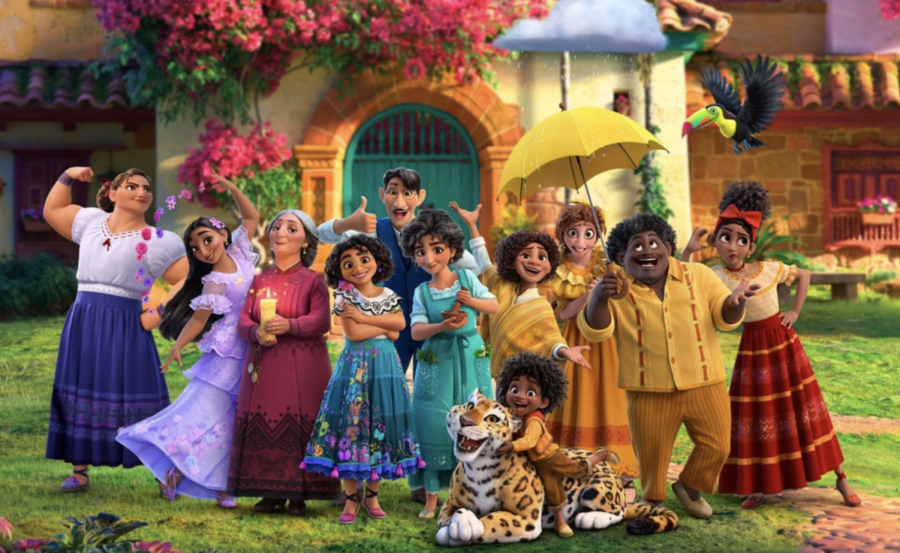‘Encanto’ expands POC narrative
Courtesy of Disney Animation Studio, 2021
“Encanto” movie poster
December 9, 2021
When we think of a Hispanic movie, what may come to mind is likely some combination of stereotypical foods like tacos, sombreros, and gang activity–unfortunately. With such a caricature being asserted in so many Latin-based films, I expected Disney’s “Encanto” to be yet another Chipotle joint in the cultural movie world, yet its strikingly authentic picturization truly adds beauty to the POC niche. Releasing on Disney+ this December, “Encanto” is a must-watch that expands the much-needed POC narrative in contemporary film.
The story follows the magical family of Mirabel Madrigal (Stephanie Beatriz), who received blessings after their Abuela Alma (María Cecilia Botero) fled her home and lost her husband due to political unrest. Years later, Mirabel, the only member without a gift, must save her family’s fleeting magic.
One of the most profound and compelling aspects of the film is its authentic representation of Colombian culture.
Lin Miranda’s soundtrack attests to Disney’s thorough research of Colombian culture, music being one of the many palpable ways Disney represents such a rich culture for its younger audiences. Breathing life into the story, I found my hands tapping my armrest to the catchy beats more than once, most notably Jessica Darrow’s “Surface Pressure” for Luisa Madrigal. While the film soundtrack isn’t Miranda’s best work, it still enlivened the theater with its upbeat and culturally-accurate tunes.
The composer paid special attention to Colombian music genres to pay homage to the Latin sound. Especially with tunes of authentic salsa, vallenato, and cumbia music echoing throughout the film, songs like “Colombia, Mi Encanto” use the power and beauty of Colombian music to add weight to the heartfelt moments in the film.
“Colombian culture, especially the music, has an almost healing quality that we wanted to get right for the film,” Miranda said in an interview.
But not only is the music accurate, so are the Colombian architecture, landscape, flora, food, clothing and more. Upon further research into the film, after watching the movie a second time, there were so many tiny details such as Colombian hand gestures and Colombian colors such as yellows, blues, and reds making their way onto the screen.
Even in the picturization of the different characters, viewers get to see a spectrum of Colombian characters itself with the variety of skin shades and hair textures used. Most notably, the protagonist is no Snow White or Aurora with lips rivaling the color of a rose– she’s just a girl with glasses who doesn’t possess overwhelming beauty or strength. Mirabel is an authentic heroine.
Surprisingly, “Encanto” wasn’t as childish as I thought it would be. Especially after Disney’s previous cultural movie “Raya and the Last Dragon,” I was expecting a similar tone that catered to a younger audience. But the jokes were genuinely funny, while the movie’s plot included real problems and darker undertones, offering an unanticipated contrast. While themes like family devotion and the “hero’s quest” archetype are commonplace for Disney, “Encanto” stands out not only in its representation but also in its themes the film masterfully incorporates.
Especially with elements of magical realism, popularized by Colombia’s own Gabriel García Márquez, the story centered around this magical family veers away from focusing solely on the magical aspect and humanizes their struggles as individuals and especially their struggles as immigrants. Even though the major conflict is centered around the Madrigal magic fading, the story is presented in a way that delves into deeper Madrigal family issues.
One such deeper conflict is the pressure of living up the expectations of their family and community. Throughout the movie, viewers are immersed in the personal pressures that are a part of the Madrigal family. Each character struggles with the pressure to meet expectations. Mirabel is an outcast for not having powers, while her relatives have to use their powers for the good of the family. There is a crushing weight on their shoulders to make their matriarch Abuela proud and Madrigal children are constantly pressured to rise above and beyond.
As a child of immigrant parents, my abilities from the way I spend my money to the way I perform in classes is often attributed to my characteristic quality of being “Indian” like it’s a superpower that I’m so extremely lucky to have and worthless without. The struggles of immigrants are humanized in a way where the Madrigals’ value isn’t contingent upon their characteristic traits, a lesson that I believe is vital for young POC especially to learn from movies such as “Encanto”.
Whereas so many Disney fairy tales feature ambitious and adventurous young characters who covet the opportunity to squish mud between their toes and escape the walls of their gilded palaces, I found it charming that “Encanto” is all about the mysteries inside and around the Madrigal’s home. It’s believable, and most importantly, relatable. Drawing parallels to the real lives of so many POC children, in the past, I often found myself wishing I could be like other people so I might stand out a little, or even just fit in, and in the case of Mirabel, this same message is echoed throughout, and it hit very close to home for me.
Especially with the limited authentic POC representation in films, “Encanto” transcends the mold of gangs, drugs, and Pablo Escobar that so many Latin-based movies are centered around, empowering POC to craft their own narratives and also gain a more holistic view Colombian values of culture, family, and love.
While Latin representation has existed in kids movies, especially with movies like “Coco,” they’ve typically portrayed Mexican culture, or some stereotype of it. And outside of “The Emperor’s New Groove,” there’s consistently been a need for representation of Central and South America, and “Encanto” expands the much-needed POC narrative in contemporary film. If you liked these films, “Encanto” will be another great piece to add to your film repertoire to get a better understanding of POC culture, one movie at a time.
Overall, “Encanto” not only celebrates Latin excellence, but it also leaves viewers with poignant themes of self-love and appreciation, truly making the film a standout piece for viewers of all ages and cultures.
10/10








